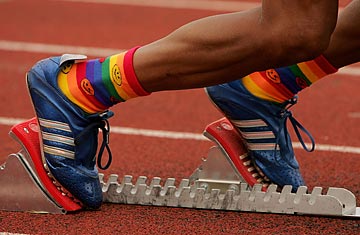
A runner prepares to begin a track-and-field event at the Gay Games VII at Chicago's Hanson Stadium on July 21, 2006
Let Chicago and President Obama compete for the Olympics. Cleveland — yes, Cleveland! — just won the Gay Games. Citing the city's world-class athletic facilities, hotels and public transportation, the Gay Games Federation announced that Cleveland will host the games in 2014. An abundance of enthusiasm, some Midwestern pluck and a boisterous night on Lake Erie didn't hurt. "It was obvious that these guys worked very hard on this for over a year," says Darl Schaaff, who led the site-selection committee for the federation. "The level of community support was just amazing."
The games started in San Francisco in 1982 and happen every four years, attracting over 16,000 gay and straight amateur athletes from around the world. (The event was originally called the Gay Olympics until the International Olympic Committee asked the Gay Games Federation to cease and desist.) Athletes compete in more than 30 sports, from track and field to table tennis. The Cleveland games will be the first to include a gay rodeo.
Cleveland's bid beat Boston's and Washington's. For a city still suffering from the foreclosure crisis, massive population flight and 40 years of industrial decline, besting larger and more famously gay-friendly cities represents a major coup. The games will attract between 50,000 and 70,000 people to athletic events in Cleveland and Akron, according to the federation's estimates, and inject over $60 million into the local economy. "We hit the mother lode," says Doug Anderson, founder of the Cleveland Synergy Foundation, which led the effort to attract the games. "I think we'll have great attendance for the whole week of the games because you can stay much cheaper in Cleveland than you can almost anywhere else in the country."
Perhaps most important is the opportunity to recast the region's image, local leaders say. In the national psyche, Cleveland remains a blue collar factory town in a conservative farm state, neither of which are particularly innovative or gay-friendly. "We've never really gone to the heartland," says Schaaff, who lives in Anchorage, Alaska. "Here was an opportunity to boldly go to a place that is perhaps not recognizable throughout the world as a gay center, but where real change is starting to happen."
Cleveland instituted a registry for domestic partners in May. The Ohio house of representatives passed a bill on Sept. 15 that would make it illegal to discriminate against gay people in housing and in the workplace. The same day, Cleveland's city council passed a law guaranteeing the Gay Games $2 million in cash and in-kind contributions. "The city of Cleveland is prepared to roll out the welcome mat to the LGBT athletes, their families and spectators from around the world," Cleveland Mayor Frank G. Jackson said in a press release.
Opposition to the bid for the games was virtually nonexistent. The Rev. C. Jay Matthews, leader of Mount Sinai Baptist Church and a prominent voice in Cleveland's African-American community, led an unsuccessful campaign last winter challenging the city's domestic-partnership registry. But he took no public stand regarding the games. "Ohio has a reputation that is more conservative than the reality," says Sue Doerfer, executive director of the Lesbian Gay Bisexual Transgender Community Center of Greater Cleveland. "This effort will change Ohio forever," says Joe Cimperman, a Cleveland city council member, who expects the council to vote next year on bills protecting transgendered people from discrimination and extending domestic-partner benefits to city employees. "You're damn right this is about an agenda. Because if this doesn't improve human equality, then why do it?"
Cleveland may also have won the bid because it knows how to party. As part of the bid process, each finalist city organized a meeting to show community support for the games. A few hundred people attended the events in Washington and Boston. In Cleveland, 7,000 people packed the Rock and Roll Hall of Fame to capacity, overflowing into an adjacent park on the Lake Erie shore. "It was a truly amazing evening," Schaaff says. The Gay Games are still five years off, but some Clevelanders already wonder what comes next. "Chicago had the Gay Games in 2006, and now they're bidding for the Olympics," Anderson says. "Could it happen in Cleveland? Absolutely."
